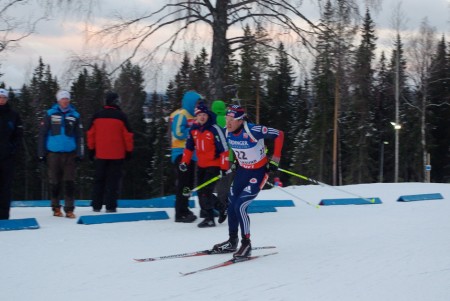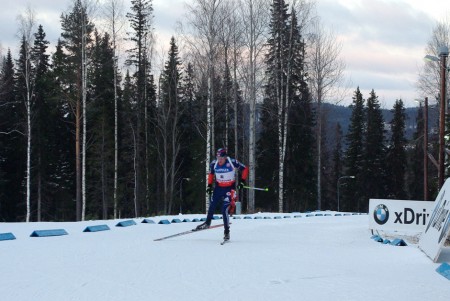ÖSTERSUND, Sweden – Top-level athletes are perfectionists, and biathletes like Tim Burke and Lowell Bailey wouldn’t typically be satisfied with shooting 80 percent in a World Cup competition (or any other time, to be realistic).
But in today’s 10 k sprint, neither seemed to nonplussed about missing two shots in the standings stage of the race.

“Honestly, it was really windy,” Bailey told FasterSkier after placing 30th, a minute and 20 seconds behind winner Jean Philippe Le Guellec of Canada. “I’m happy with eight. Usually I would say that I’m disappointed with that, but today, no. I wish I had shot a little quicker.”
Both men said that they spent a lot of time in standing, waiting for the gusts of wind that scattered penalties throughout the men’s field to die down and allow them a clean shot. That didn’t happen, and they were stuck with missed targets anyway.
“It was definitely a pretty windy day,” said Burke, who eventually placed 18th but didn’t know how he would end up after starting with bib two; when he talked to FasterSkier, most of the field was yet to finish. “I think you’re going to see a lot of penalties. In standing I was waiting, and waiting, and then, yeah, I just had to start shooting. I needed to get out of there! It was tough, but I think it will still be a decent result. At least I shouldn’t be too far back for tomorrow’s pursuit.”
The extra time spent waiting didn’t just add up in seconds, it also had a physical toll.
“Your legs start shaking,” said Bailey. “It’s tough.”
Competitors also had the cold to contend with, which was something of a surprise after a warm November here in Sweden. But Burke, for one, said that his ski shape was coming around, and despite not dealing perfectly with the challenges of today’s race, he was positive about the next few weeks.

“It was cold!” he exclaimed. “You know, we’ve been training in – well, the first two weeks we were here, it wasn’t below zero once. And now I guess it’s more like normal winter. But man, it was cold. But we had good skis, and I’m feeling better and better with each hard effort now.”
Leif Nordgren became the third American to qualify for Sunday’s pursuit race, missing two shots of his own but this time in prone. He finished 54th, just over two minutes behind Le Guellec and in a part of the field where every second counted: three seconds faster and he would have made the top 50, and 14 seconds slower would have put him out of the 60-man pursuit.
Jay Hakkinen had three penalties and Russell Currier four, as they placed 75th and 80th.
* * *
In the women’s race, the wind died down and penalties weren’t quite as common – a few more racers shot clean, and many had one rather than two penalties. The U.S. women struggled on the range nonetheless, and were left frustrated with a slow start to the season.
“I blew it,” said Annelies Cook, who missed four shots in standing and six overall. She tried to take her anger out on the trails, but was still unable to make up ground, placing 90th despite having the 42nd-best course time.
Susan Dunklee didn’t word her feelings quite so strongly, but the sentiment was the same after placing 43rd, the only American to qualify for the pursuit.
“It was a little rough on the shooting range,” she told FasterSkier. “I’m kind of struggling with a funk in shooting recently. So that was disappointing. But skiing was fine. I got lucky and caught a ride behind Tora [Berger, the race winner] on the second loop. We were moving pretty good, but it felt so relaxed because I was following her rhythm, so I was really happy about that. The whole lap! I was really happy.”
The skiing today, she said, was an improvement on a frustrating individual race on Thursday, where she did not feel sharp on her skis. As for her four missed shots, “I didn’t get any major gusts, so I don’t really have an excuse.”
Sara Studebaker had similar woes, riding three penalties to 81st place. At the beginning of the race, she felt like she was doing well.
“It was the first race – well, the first training day even – that I’ve had that my hands were cold,” she said. “I took a lot of time in prone because I couldn’t feel my fingers. I hit all my targets, so that was good… I feel like I deal with adverse conditions pretty well, so I wasn’t that concerned.
“It’s just like any other race, you have the same strategy,” she continued. “I knew coming in that my hands were cold and I had to take a little bit of extra time, and be careful with the trigger. But other than that, it’s just to take every shot and see what happens – like, oh, there’s a big gust of wind, you have to wait. You just have to really respond for that kind of stuff.”
But after cleaning in prone, she didn’t have such great luck in standing. She told FasterSkier that she is still racing herself into race shape, and the combination of shaky legs from a hard effort on the trails and a bit of wind was too much to overcome.
But for Studebaker, like Dunklee, there was a silver lining in terms of skiing.
“Going into my last loop, one of the Germans and I left the penalty loop at the same time, so I got a ride on her for the first half of the loop,” Studebaker said. “Then I was able to pass her on the big hill and beat her to the finish line. It felt pretty good to have a good last kick there at the end. The ski shape is coming, it’s coming.”
Lanny Barnes placed 98th with four penalties.
Chelsea Little
Chelsea Little is FasterSkier's Editor-At-Large. A former racer at Ford Sayre, Dartmouth College and the Craftsbury Green Racing Project, she is a PhD candidate in aquatic ecology in the @Altermatt_lab at Eawag, the Swiss Federal Institute of Aquatic Science and Technology in Zurich, Switzerland. You can follow her on twitter @ChelskiLittle.



